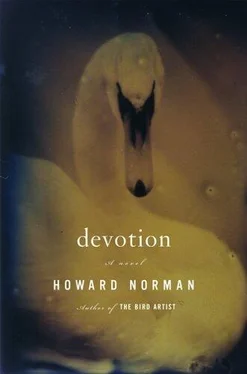A chauffeur-driven Bentley waited out front. The doorman escorted Macomb under a hotel umbrella the few steps from awning to curb, held open the car door. David saw Macomb tip the doorman.
IN FACT, Maggie returned to Durrants Hotel in a little more than an hour. She paid the cabbie, got a receipt, stepped from the cab and stood on the sidewalk just to the left of the awning. She smoothed down her dress, thought, I’ve worn this two days in a row now. But if she went upstairs to change, David might notice. She might then have to say, “Well, all right, so I am staying here. But a woman today has to be careful,” or something like that. What did she owe him? She did not know him in the least. It had stopped raining but still threatened rain. She saw David Kozol through the window into the dimly lit bar. He sat at a small table, a glass in front of him. When he turned toward the window (he had been turning toward it frequently) and saw Maggie, he immediately started for the lobby. She viewed what happened next as a kind of choreography, how the short-sleeved young waiter lifted David’s glass and napkin, how the window washers leaned back laughing in unison, how David waved at her over his shoulder as he disappeared into the hallway. It was a view, she thought, through an amorous window.
Amorous window. The phrase derived from a concept she had read about in a Japanese novel, a philosophical love story. Back in 1983, she had fallen in love for a short time with a visiting professor of history, Shizuko Tushimo, who gave her this novel. In broad outline, the concept of the amorous window was that passion of a sudden and unprecedented intensity can imbue a window with palpable eroticism. In the Japanese story — now Maggie remembered the title and author, The Café Window, by Yasushi Inoue — the final irony was, years after an affair, the woman character recalls the window but not the name of her beloved. The window remains clear in her mind, rain-streaked, spectral, whereas the man in question has faded from memory Standing in front of Durrants Hotel, Maggie, who had heretofore considered romance pretty much an abject condition, realized that no matter the outcome of her meeting with this David Kozol, she had long desired to experience an amorous window. And here, on an April afternoon in London, she was looking through one.
In the intervening time between leaving and returning to the hotel, Maggie attended to the perfunctory task of finalizing a schedule of radio interviews several of the ensemble’s musicians would hold with Paul Marchand, the concert hall’s publicist. Marchand would offer these to newspapers, music journals, classical-music radio programs. It was standard procedure on these tours and Maggie was very good at it. Marchand, in his early forties, was pleasant enough. His all-business demeanor proved perfect for keeping Maggie focused. Though at one point she thought, What am I hoping will happen next? It was a brief interlude of preoccupation, merely seconds. Snapping back to the present, she said, “Excuse me, I have to use the ladies room.” When she sat down at the table again in Marchand’s office, she found him putting papers into his briefcase. He looked up and said, “Actually, Miss Field, I think we’ve covered everything. Tea?”
“Oh, sorry, can’t,” she said. “I’ve got an assignation — appointment, I mean.” The slip surprised Maggie, who felt disappointments were in direct proportion to expectations, so best keep expectations low; how certain she was that David Kozol would be waiting at Durrants Hotel. Marchand arranged for a cab.
She was not a woman who simply dropped her clothes. That was a phrase favored by her mother, who first introduced it when Maggie was sixteen and lived, of course, with her parents at the estate. It was her mother’s warning, a preemptive admonishment toward any young woman, not Maggie alone, who fell to sleeping with a man before falling in love, in fact testing it with celibacy. “Marlais — your second cousin,” her mother said, sighing in genuinely sad resignation, “well, Marlais dropped her clothes. Just like that. And, I heard, on more than one occasion.” Hearing this in her memory just then, Maggie smiled at the endearing quaintness of her mother’s exasperation and concern, let alone her phrasing. As the cab turned onto George Street and the hotel came into view, Maggie thought, I’m thirty years old. Yes, I have dropped my clothes, perhaps twice, but mostly I have waited to know someone. Mostly. And so far I have not regretted it either way.
Sitting for drinks opposite each other at a table in the bar, with its well-worn leather banquettes, chess and cribbage boards, scattered magazines, Maggie said, “I’m Margaret Field.” She and David shook hands. He tried to take in her physical self without being obvious, but of course she detected right away and thought, Let’s just get this out of the way, shall we? She had fair skin, a constellation of freckles on the left side of her face, a slightly denser one on the right, dark red hair, green eyes; her smile had two stages, tight-lipped to hesitantly open, and for all David knew, that might be the full extent of it. “I know,” Maggie said, “you look at me and you probably think ‘Irish,’ huh? But my mom and dad are from Scotland. There might’ve been an Irish assignation a long time ago. Who knows?”
Maggie ordered a gin and tonic, two slices of lime, which she squeezed into the glass, then touched the rinds to her tongue before setting them back in. David ordered a White Russian, too sweet, but the cream in it soothed his jittery stomach. “My friends call me Maggie, but in a way, I prefer Margaret. I’m publicity director and all-around trouble-shooter for an ensemble out of Dalhousie University, Halifax, province of Nova Scotia, Canada. They play classical music.”
“I’m from Vancouver,” David said. “Though I haven’t lived there since high school.”
“Two Canadians, then, having a drink together in London.”
“Do you like your job?”
“Yes, I do. I do like it. We’re on tour here. London. Copenhagen. Oslo. Rotterdam. So I get to see the world. I iron out all the problems. And you, David Kozol, how do you earn your keep?”
“I teach photography.” He had never before defined himself like that. Or had not ever thought of himself first and foremost as a teacher. He felt a slight stab of recognition and disappointment, not that Maggie would notice. He simply wanted her to believe he had definition. Wanted her to think he was occupied in a useful manner. He hoped she would not ask if he took photographs himself, though it would be the logical question. Not ask it right away, at least. He had a book of Sudek’s photographs and a half-composed letter to Katrine Novak (not a love letter: some thoughts about possible dates for his next visit to Prague — the contents could have fit on a postcard) in his leather satchel, which was at his feet.
“Kozol is what, exactly?”
“Czech. My grandfather was from Czechoslovakia. On my mother’s side.”
“The ensemble canceled Prague, or vice versa, I can’t remember. Anyway, we aren’t going there this time around.”
“It’s a beautiful city. Mysterious city, I think.”
“I’ve never been.”
It was surprising to Maggie, and equally so to David — each of whom did not counterfeit expectations or tailor their personalities to fit sudden possibilities — that their conversation lasted three straight hours without food and with remarkably few awkward silences. At the least, it was a welcome indulgence to both, requiring no additional drinks, either, to the annoyance of the bartender. Then the mood changed. Perhaps it was as simple a matter as a mutual sense of happiness, a lack of detected affectation, and not a little outright lustful attraction. With a relaxed, though slightly giddy aspect, there arrived a fait accompli, a telepathic decision to extend the meeting elsewhere. “My flat is two blocks away,” David said.
Читать дальше












